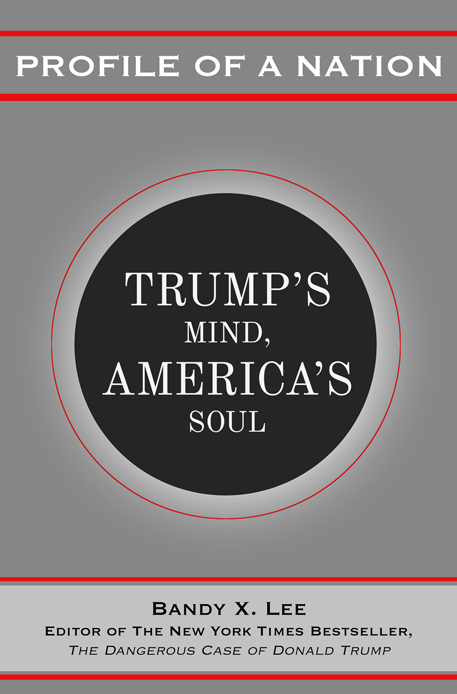by Bandy X. Lee, MD, Mdiv
Mary Trump’s recent article pinpointed our problem with “the Goldwater rule”: “in March 2017, shortly after [Donald Trump] was inaugurated, the APA didn’t just reaffirm the rule—it expanded it past the point of coherence.” This incoherence is the reason why we held an ethics conference at Yale School of Medicine by the title, “Does Professional Responsibility Include a Duty to Warn?” the very next month. It drew national attention and led to the public-service book, The Dangerous Case of Donald Trump: 37 Psychiatrists and Mental Health Experts Assess a President. The incoherence alarmed me enough to drop everything and to speak up, becoming a whistleblower not just of the president but of the American Psychiatric Association.
Our book became an unprecedented New York Times bestseller of its kind, and we donated all revenues to the public good so as to remove any conflict of interest. Featured authors represented only a sample of the many thousands of mental health professionals who came forth in historically unprecedented ways and formed the National Coalition, which became the World Mental Health Coalition with international membership, by the end of the year.
Demands for an update gave rise to the book’s second edition, published in March 2019, alongside another unprecedented conference at the National Press Club by the title, “The Dangerous State of the World and the Need for Fit Leadership.” A panel of thirteen top national experts assembled from fields as diverse as law, history, political science, economics, journalism, social psychology, nuclear science, and climate science, and C-SPAN broadcast our three-hour discussion in full. In this manner, we tried to educate the public about how the president’s psychological dangers translated into social, cultural, civic, and geopolitical dangerousness and recently followed up with an emergency follow-up meeting.

Since the first Yale conference, Congress members had reached out to us, and eventually we met with over fifty lawmakers on Capitol Hill. They asked us to educate the public on our medical domain so that they could act in their political domain. We were initially very successful, raising the issue of the president’s mental health to become the number one topic of national conversation. Many of us were interviewing with the media many hours a day, every day, and the public was listening.
Then, the American Psychiatric Association (APA) stepped in with its “Goldwater rule,” accusing us of “armchair psychiatry” and “the use of psychiatry as a political tool,” even though alerting the public about potential dangers and the need for a public servant to undergo an evaluation is not diagnosis. It is a part of our professional responsibility to society, as outlined in the APA’s own code of ethics. Further, the APA itself says we should “serve society by advising and consulting with the executive, legislative, and judicial branches of government.”
By expanding beyond coherence to include not just diagnosis but any comment, it seemed to overlook actual diagnosis. One of its past presidentsdiagnosed in great detail, ruling out multiple conditions until he arrived at “incipient dementia.” Another one of its former task force leaders diagnosed no disorder. Neither exclusion nor inclusion is possible from a distance without full medical records (a personal interview has not been a requirement, on the other hand, since 1980 when diagnostic criteria mostly changed to objective observation).
Objecting to the APA’s distortion of professional ethics, a number of us, including several APA distinguished life fellows, wrote letters, demanded debates, and submitted a “Goldwater rule revision proposal,” but the APA refused even a discussion. Instead, it went on public campaigns that effectively ended our coverage by the major media.
A colleague suggested that I “follow the money” for reasons of incoherence. Indeed, the APA not only reaped exceptional federal funding since these actions, but a high-ranking officer in the APA directly admitted that financial concerns were behind its decision.
While the loss of media exposure hampered our efforts to meet our societal responsibility, no one seemed to feel the loss more than the public. It never stopped flooding us with the messages, “Where are the psychiatrists? Where are the psychologists?” Americans had to learn to do without expertise, just as it has with the pandemic, and the results have been equally devastating. Since learning of Covid-19, we stated that the death toll would reflect not the characteristics of the virus but the president’s mental state, and now we have a blow-by-blow account of how what we said would happen, happened. A Columbia University study now confirms that 130,000 to 210,000 of the Covid-19 deaths were avoidable.
In a few weeks, 400,000 lives will be lost. In my 20 years of treating violent offenders, I recognized that perpetrators never fully understand the magnitude of their harm, or they would not be doing what they do in the first place. But we knew. We have consistently and correctly identified areas of risk, explaining the primary mental health problem, and proposing solutions. The APA permanently stopped us from getting the word out, so that prevention would be possible.
Knowledge saves lives. We believe that there are still many dangers we can avert if we had a full understanding of the situation at hand, without singling out mental health as the one field people cannot hear from. Our latest action includes more than one hundred mental health professionals going on video record to state that Mr. Trump needs to be removed from the presidency and candidacy for reelection for reasons of psychological dangerousness and mental unfitness. In a sane society, experts’ voices would matter.
Disclaimer: Dr. Lee was active in the American Psychiatric Association, for about a decade as a fellow, until its pharmaceutical industry corruption caused her to resign in 2007.